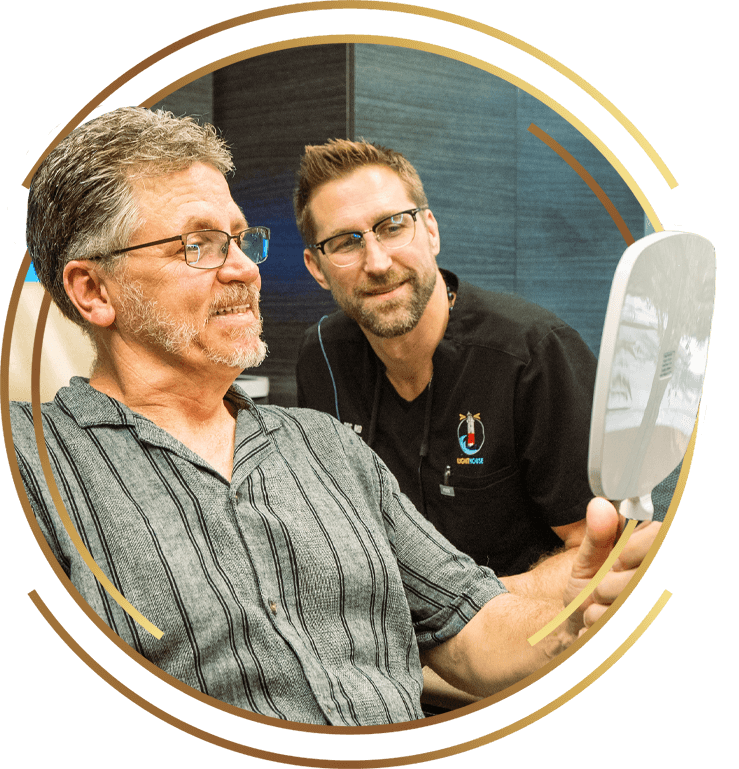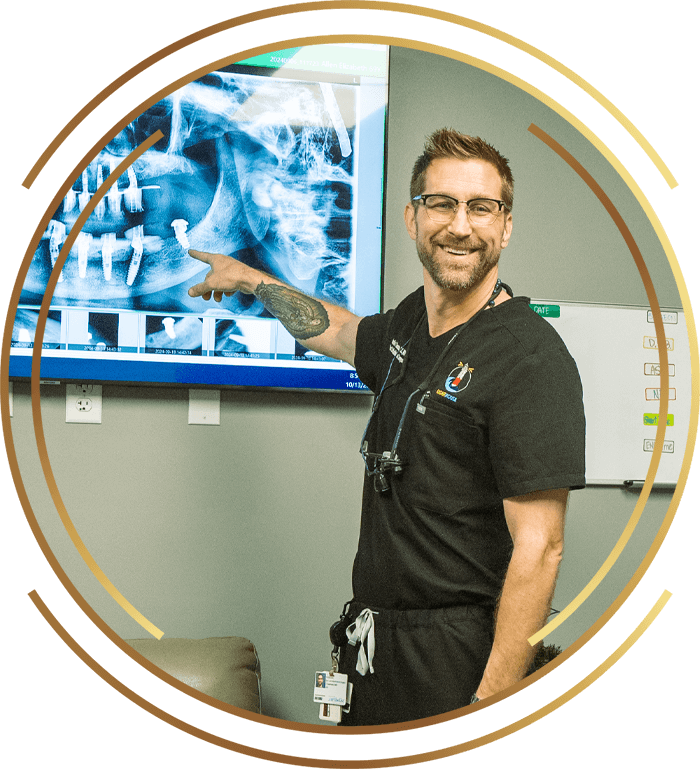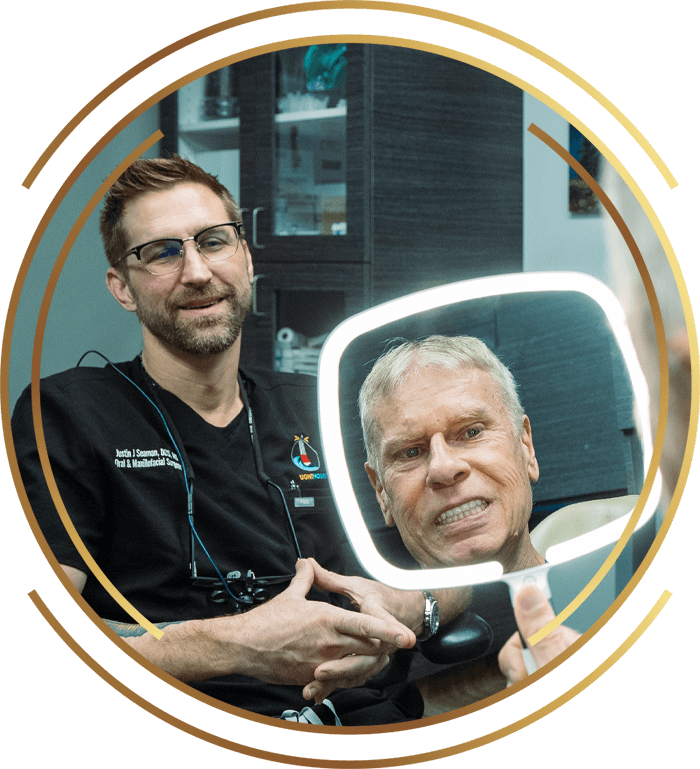Dental Implants - Houston, TX
Build a Strong Foundation for a Restored Smile with Dental Implants

What Are Dental Implants?
Tooth loss can hurt your quality of life, making you feel self-conscious about your smile and unable to eat certain foods and speak and laugh easily. If left untreated, tooth loss can cause premature wear to remaining teeth and lead to bone loss. 25% of supporting jawbone structure is typically lost within the first year after losing a tooth. This can result in undesirable changes to your facial aesthetics, especially if you have multiple missing teeth. Dental implants at Memorial, Houston, TX, and Medical Center, Houston, TX, are the number one solution to fill gaps left by one or more missing teeth and recreate a fully functional and attractive smile!
Dental implants replace an entire tooth, with the screw-like titanium post assuming the role of the missing tooth root, a connecting piece called an abutment, and the visible part in the form of a zirconia crown, fixed bridge, or full mouth prosthesis. When you entrust your missing smile to the skilled oral and maxillofacial surgeons at Lighthouse Oral & Maxillofacial Surgery, we customize dental implant treatment to meet your unique clinical needs and deliver superb outcomes! We also believe everyone deserves the excellent benefits of an expertly restored smile, so we strive to offer affordable dental implants at Memorial, Houston, TX, and Medical Center, Houston, TX.

The Unrivaled Benefits of Dental Implants
- Restores chewing ability
- Rejuvenates smile aesthetics
- Helps prevent jawbone deterioration
- Preserves health of surrounding bone and gums
- Maintains stability of adjacent teeth
- Improves self-esteem and quality of life
Versatile Dental Implants from Our Experienced Oral Surgeons
If you lost just one tooth, a single dental implant is an excellent choice to preserve natural balance and harmony. Unlike a traditional dental bridge, a dental implant doesn’t require modification of a healthy tooth while also protecting your underlying bone health.
A traditional dental bridge sacrifices the structure of surrounding good teeth to bridge the space left by your missing tooth/teeth. Instead of modified and crowned adjacent teeth, an implant-supported bridge relies on the strong support of dental implants to replace one or more missing teeth in a row. The dental implants stimulate your jawbone like regular tooth roots, helping preserve bone volume and density while reducing the risk of bone atrophy. Unlike traditional bridges, an implant-supported bridge can last a lifetime with proper care.
Unlike conventional dentures that rest on top of your gums and rely on suction and adhesive to stay in place, implant-supported dentures are anchored to your jawbone with implants. Although the prosthesis can be created as a removable bar-retained or ball-retained overdenture that snaps into place, a fixed implant-supported denture provides excellent stability. Implant-supported dentures are cost-effective, significantly improving oral function and smile aesthetics.
All-on-X full mouth dental implants at Memorial, Houston, TX, and Medical Center, Houston, TX, provide several advantages over other tooth replacement options. This protocol offers the added stability of placing as many as eight dental implants per arch.
In addition to looking and functioning like natural teeth, full mouth dental implants are comfortable, completely stable, and longer lasting than conventional dentures. Full mouth dental implants require the same oral hygiene as natural teeth, and because some of your missing tooth roots are replaced, your bone and facial structure are preserved.
Your Journey to a Renewed Smile with
Top-Quality Dental Implants

Consult & Planning
During your consultation at Lighthouse Oral & Maxillofacial Surgery, we’ll help you determine if dental implants are the best option to achieve the desired results. We’ll discuss the process and costs to help you make an informed decision. We use advanced technology to obtain detailed images of your mouth and underlying structures.
Imaging is also essential for planning exactly where dental implants should be surgically placed. If imaging reveals that you have inadequate bone to successfully place dental implants, bone grafting may be done before implant surgery. Sometimes, we can perform bone augmentation and tooth extraction during the same visit as implant placement.

Procedure & Same-Day Teeth
Many of our dental implant patients choose IV sedation to ensure a comfortable and relaxing experience. Once sedation is administered, we gently make a small incision in the gum tissue to access the The dental implant is then carefully placed in a predetermined location to ensure precision and success.
Over the next few months, the implant integrates naturally with the bone through a process called osseointegration, forming a strong foundation for your new crown, bridge, or full-mouth With the innovative All-on-X protocol, we can even provide temporary teeth on the same day as your surgery, so you can leave with a confident smile.

Follow-Up Appointment
Before leaving our office, we’ll provide detailed instructions to aid in healing and recovery. Although it’s common to experience some postsurgical discomfort, over-the-counter pain relievers are often sufficient to alleviate minimal pain.
You’ll schedule a follow-up visit so we can check your implant site(s) and ensure healing is progressing as expected. During this visit, we can address any issues you may be experiencing to prevent infection and support the healthy integration of your implant(s).

Healing & Final Restorations
It’s important not to bite down on a new implant while it heals, especially if you have a temporary crown. You should also be cautious while eating for the next couple of months. Ideally, you’ll want to start with a soft food diet and gradually introduce other foods as tolerated.
Once osseointegration is complete, we may need to expose the top of the implant and attach the abutment before fitting you with your replacement tooth or teeth. After we fit you with your permanent restoration, you can eat, smile, speak, and laugh with newfound confidence!
Our Patients Tell The Story Best

Throat Cancer Really Took A Toll On My Teeth... I Needed A Solution
David - AOX
Schedule An Appointment
I understand the information disclosed in this form may be subject to re-disclosure and may no longer be protected by HIPAA privacy regulations and the HITECH Act.


